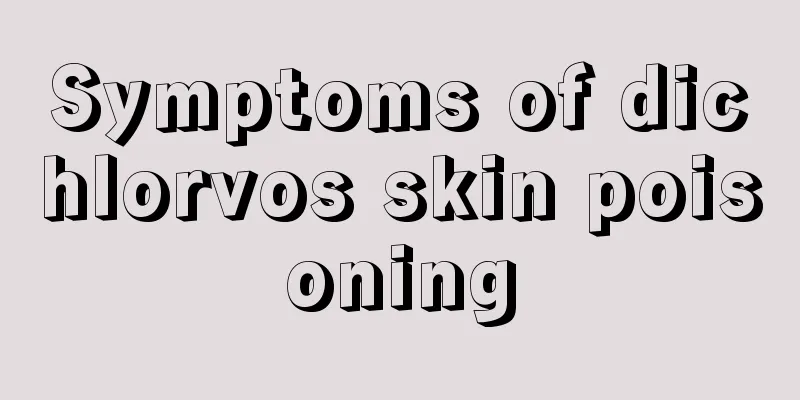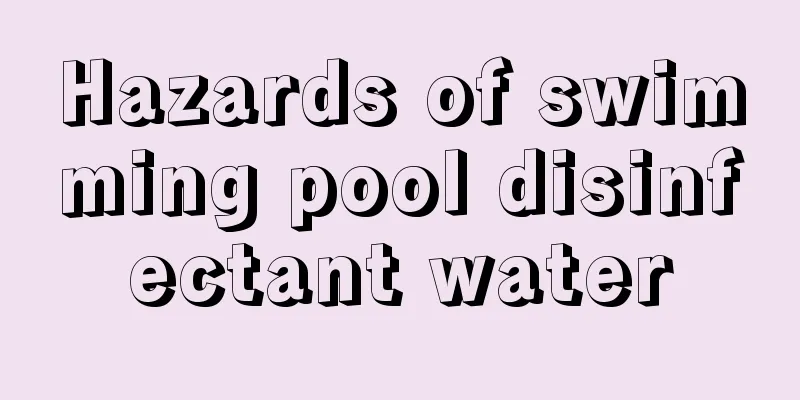Symptoms of dichlorvos skin poisoning

|
Dichlorvos is a commonly used anthelmintic in our lives. This drug is very toxic. Even for anthelmintics, it needs to be diluted before use. Some people have sensitive skin. When using this drug, it is likely to cause skin poisoning and allergic reactions. Most people will feel uncomfortable in their noses when they smell it. So what are the symptoms of dichlorvos skin poisoning? People who are poisoned by skin and mucous membrane absorption should leave the scene immediately, take off contaminated clothes, and repeatedly wash the contaminated skin, hair and nail crevices with soapy water. Do not use hot water or alcohol to scrub to prevent skin blood vessels from dilating and promoting absorption of the poison. Eye contamination can be rinsed continuously with 2% sodium bicarbonate solution, normal saline or water. 1. When spraying pesticides, wear thick long-sleeved shirts and long pants, tie up your cuffs and trouser legs, and wear a mask and gloves. If clothes are contaminated, change them immediately and wash your skin. 2. All objects that come into contact with pesticides must be rinsed repeatedly with clean water. Containers that have contained pesticides should never be used to hold food again. If you experience dizziness, chest tightness, drooling, nausea, vomiting, or other signs of organophosphorus poisoning while in contact with pesticides, you should seek medical attention immediately. Apply detoxifying drugs. Anticholine drugs and choline glycosides reactivators. Symptoms of dichlorvos skin poisoning? Symptom 1: Difficulty breathing, requiring timely oxygen inhalation, heavy sweating, drinking light salt water in time, and intramuscular injection of diazepam for muscle cramps. Clear oral and nasal secretions promptly to keep the respiratory tract open. After the condition improves, the dosage can be gradually reduced and the interval between medications can be extended. Symptom 2: Skin contact poisoning develops relatively slowly, but can cause severe symptoms after absorption. Early or mild symptoms of poisoning by this type of pesticide may cause dizziness, headache, nausea, vomiting, salivation, sweating, blurred vision, fatigue, etc. In addition to the above symptoms, patients with more serious conditions also have pupil constriction, muscle tremors, tearing, increased bronchial secretions, dry and wet rales and wheezing in the lungs, abdominal pain, diarrhea, confusion, unsteady walking, bradycardia, fever, chills, etc. Symptom three: Severe cases often have abnormal heart rhythm such as tachycardia, atrioventricular block, atrial fibrillation, increased or decreased blood pressure, cyanosis, dyspnea, foaming at the mouth and nose even with blood (pulmonary edema), convulsions, coma, incontinence of stool and urine or urinary retention, paralysis of the limbs, loss of reflexes, etc., and may die from respiratory paralysis or circulatory failure. Precautions In short, it is best not to keep Dichlorvos at home. If there are children at home, be sure to put it in a place where children cannot find it. If someone is found to have accidentally ingested Dichlorvos, send him to the hospital for gastric lavage immediately. Do not leave Dichlorvos outside to avoid contact with animals. |
<<: Symptoms of protein indigestion
>>: Symptoms after intervention
Recommend
How to remove rust from rusted silver
Silver is a metal substance extracted from natura...
What are the symptoms of lingual papillitis?
The tongue is the most important sensory organ of...
How to quickly soak sea cucumber
Sea cucumber is not only a very precious food ing...
10 early signs of cervical cancer
There is usually no accurate statement of the 10 ...
If you have a stitch in the side, don't take it lightly
A stitch in the side is an internal injury. The c...
What should I do if brown sugar gets moldy
When buying brown sugar, many people know that if...
What to do if upper eyelids droop
When people reach a certain age, their skin will ...
Is it better to have a high or low basal metabolism
The human body has metabolism every day. Some peo...
Does liposuction surgery hurt?
For many women who love beauty, they will try any...
How long can winter vegetables be kept
When it comes to pickled foods, many people prais...
Acne on face due to seafood allergy
Many people love to eat seafood, but eating seafo...
Will eating peach shortbread make you fat?
Among the various types of snacks, peach shortbre...
Preoperative and postoperative nursing measures for endometrial cancer
We all know that there are many diseases that thr...
What causes fibroids
In today's society, fibroids are a topic that...
Analyzing the causes of colon cancer in patients
Colon cancer is a malignant tumor that endangers ...









